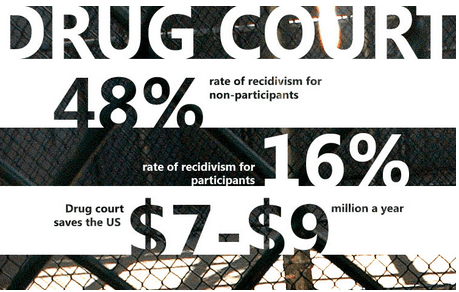There has been an increased interest in the judicial system among advocates for people living with mental illness:
Human Rights Watch shocked America with the truth. A 127-pageinvestigative report describes a criminal justice system in America and its use of excessive force, even systemically brutal and malicious. The report, Callous and Cruel: Use of Force Against Inmates With Mental Disabilities in US Jails and Prisons,” charges in no uncertain terms that, “Jails and prisons staff throughout the United States have used unnecessary, excessive and even malicious force against prisoners with mental disabilities.” http://www.huffingtonpost.com/ginger-lernerwren/the-criminalization-of-pe_2_b_7436426.html
Moreover, the Department of Corrections reports that:
In a 2006 Special Report, the Bureau of Justice Statistics (BJS) estimated that 705,600 mentally ill adults were incarcerated in state prisons, 78,800 in federal prisons and 479,900 in local jails. In addition, research suggests that “people with mental illnesses are overrepresented in probation and parole populations at estimated rates ranging from two to four times the general population” (Prins and Draper, 2009). http://nicic.gov/mentalillness
Anyone following my blogs knows that I am one of those statistics: I have Bipolar Disorder I. I spent 65 days in county jail. I am on probation and I am in a novel program called Drug Treatment Court.
The first drug court in the United States took shape in Miami-Dade County, Florida, in 1989, as a response to the growing crack-cocaine problem plaguing the city. All 50 states now have working drug courts, with a total of more than 2,400 courts. About 120,000 people treated annually in drug courts, though an estimated 1.5 million eligible people are currently before the courts. http://en.wikipedia.org/wiki/Drug_courts_in_the_United_States
My Drug Treatment Court is a team of judicial, mental health and addiction specialist staff. I am in direct contact with the following on a regular basis:
- Director of Drug Treatment Court – does my urinalysis weekly, presents my case (bi-weekly) in court to the Judge and monitors my progress in the Graduating Phases (1-4) of DTC.
- Probation Officer – monitors my home environment, drug screens, ongoing judicial involvement and probation adherence.
- Court Liaison for my MH/SA Team – wears many hats from counselor to case manager to advocate to awesome hug-giver.
- Addiction Counseling group leader – facilitates myself and about a dozen cohorts in bi-weekly group therapy and does individual therapy as needed.
- Drug Court Judge.
- Representative from the District Attorneys office.
- Public Defender.
- Nurse.
- Psychiatrist – specializes in addiction treatment as well as MH issues.
- Transition Case Manager – Helps me set goals and follow through with them in regards to Recovery, Work/School, Family, Housing, Finances, Personal Relationships, Physical Well Being, Mental/Emotional Well Being, Spirituality (not religion) and Recreation.
- Narcotics Anonymous (NA) Sponsorfriend and supporter who helps me work on changing my moral defects as well as my addictive patterns.
- Over a dozen NA meetings with, literately, hundreds of peers
- Dialectical Behavior Therapy counseling and group therapy.
A month in the life of DTC:
- I have appointments with my MH providers, which are monitored by DTC for compliance (missing appointments can result in 24-72 hours in jail, depending on how many appointments are missed). This is very helpful to me. I have chronically missed appointments for years prior to DTC.
- I have 3 two-hour group therapy sessions a week (phase one), which gradually becomes 1 one-hour treatment a month, as I pass through the phases by complying with all rules. I am currently in phase two (2 one hour sessions per week).
- I meet with the DTC Director weekly when I am (randomly) called for urinalysis. I asked for DTC to ensure I had this safeguard.
- I meet with my PO twice a month (once in her office and once in my home).
- I attend 3 NA meetings a week (mandatory).
- I attend weekly DBT group and individual therapy.
- I attend 2 Court Sessions per month. This has become my favorite part. When the DTC Director reads our review and announces clean drug screens the entire courtroom – including the Judge – claps for us. Graduation from DTC is held during Court and involves speeches by numerous officials, gifts and handshakes from all our peers. NOTE:, failed Urinalysis, missed treatments or MH appointments or other infractions can lead to sanctions of 24 hours to 5 days in county jail (Bailiffs take you out of the courtroom right there), being sent to inpatient drug treatment, or being discharged from DTC.
This process has taught me to be patient with life (and myself), it has taught me responsibility to care for myself (my mental and physical health), it has taught me to be a woman of my word, to ask for help and many many other important lessons that years of untreated mental illness and addiction prevented me from learning. I have grown and matured and learned to manage my symptoms more since last December than in the entirety of my adult life (most of which I have spent searching for personal growth and insight).
Drug Treatment Court isnt for everyone with mental illness involved in the judicial system, but for me it has been the greatest blessing I have received. Never underestimate the power of support, accountability and love! my journal.
Read the rest of Liz’s posts here.


